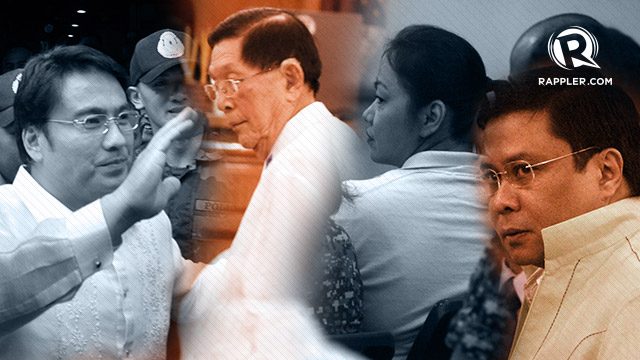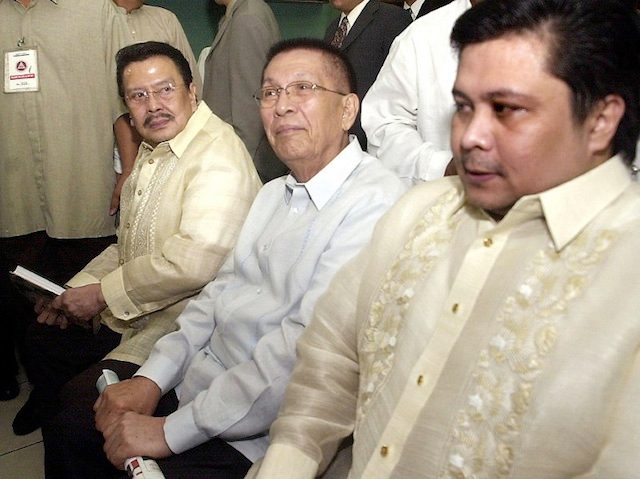SUMMARY
This is AI generated summarization, which may have errors. For context, always refer to the full article.

MANILA, Philippines – More than a year since the pork barrel scandal was exposed, how well has the legal system performed in unearthing the truth behind it?
Backed by the tell-all accounts of whistleblowers, supported by the timed release of a special report conducted by the Commission on Appointments (CA), a Senate investigation, a less-than-contrite confession by the alleged mastermind, and persistent denials by lawmakers implicated in the scam, the plunder and graft cases of Senators Juan Ponce Enrile, Jinggoy Estrada and Ramon “Bong” Revilla Jr are now being tried before the Sandiganbayan.
If self-styled businesswoman Janet Lim Napoles is seen as the icon of the pork barrel scam, the filing of the cases against the 3 senators is the counterpoint of the Aquino administration’s campaign against graft and corruption.
The cases are unprecedented: for the first time, 3 incumbent members of the Senate are locked up in detention cells for alleged conspiracy with Napoles in supposedly misusing their Priority Development Assistance Fund in exchange for millions of pesos in kickbacks.
While former president Joseph Estrada is the highest ranking public official charged and convicted for plunder, he was no longer in power when the case was filed against him in 2001. (In the 2001 plunder case, Jinggoy was also a co-accused. They were charged with enriching themselves from jueteng operations and stock manipulation, and getting kickbacks from the tobacco excise tax.)
Just like in Estrada’s plunder case, the filing of the cases against the lawmakers is replete with political shades. Enrile, Estrada and Revilla belong to the opposition, and with the 2016 national elections just less than two years away, the ranks of the opposition is close to being decimated.
Prior to their arrests, Estrada and Revilla were eyeing higher posts, with the former being floated as a vice presidential candidate and the latter, a potential presidential candidate. These two were topnotchers in the 2010 senatorial race, with Revilla getting 19.5 million votes and Estrada garnering 18.9 million votes. Only Senator Grace Poe has a higher record – she got 20.3 million votes in the 2013 midterm polls. (READ: Official tally of votes for the 2013 senatorial race)
For his part, Enrile, who at one time, contested the presidency, is considered a “kingmaker” in his own right.

Pace of trial
Based on the plunder trial of former president Estrada, the plunder cases of the 3 senators are expected to last for at least 6 years. A special division heard Estrada’s case, yet despite the marathon hearings, it took the prosecution 3 years to present its witnesses and evidence, and the defense, another 3 years to present its side.
In the senators’ plunder charges, the anti-graft court has the option to consolidate the cases into one. But for some reason, they agreed to split the cases, while at the same time ignoring a request from the Ombudsman to form two special panels to handle the cases. In the raffle that resulted – the first division got Estrada’s case; the third, Enrile’s; and the fifth, Revilla’s.
In the Estrada patriarch’s case, it took the special division only 6 days to determine probable cause and issue the arrest warrant. (The subsequent arrest of Estrada triggered EDSA 3 that almost led to the collapse of the Arroyo government.) However, due to numerous motions filed by Estrada before the anti-graft court which reached the Supreme Court, his arraignment only took place almost 3 months after he was arrested.
In the present plunder cases, the 3 divisions took between one to 3 weeks to determine probable cause and issue the arrest warrants. On June 6, the 3 senators were indicted before the Sandiganbayan. Revilla was first to be arrested on June 20, followed by Estrada on June 23. Enrile was ordered detained July 4.
All 3 senators have different pending motions before the SC but failed to secure a temporary restraining order. On June 26, Revilla was arraigned for plunder and graft charges, followed by Estrada on June 30. Enrile, for his part, was arraigned for plunder July 11 although he is yet to be arraigned for the separate graft charges.
More than two months since they were arraigned, the trial has been proceeding at a regular pace with hearings held at least thrice a week.
Principal state witness Benhur Luy, who told authorities what he knew about the scam – after supposedly having experienced enlightenment during his 3-month captivity in 2013 – testified a number of times before the Sandiganbayan in connection with the bail hearings of Revilla, Enrile, and Estrada.
Wrong foot forward
The filing of the plunder cases would have been an elementary exercise for the prosecution. After all, this is not the first time they are encountering such cases. Since 2001, 8 plunder cases have been filed before the Sandiganbayan, excluding Estrada’s 2001 case. Before this, the government secured the conviction of 3 Bureau of Internal Revenue officials for plunder. (READ: Plunder in the Philippines)
But early on, the prosecution almost bungled its case and faced embarrassment.
The prosecution’s panic attack was triggered by the argument of Napoles’ lawyer, Stephen David, who pointed out that his client could not be charged for plunder since she is not a public official. David was referring to the information in the charge sheet that Napoles conspired with lawmakers to commit plunder and enrich herself in the process. (READ: No conspiracy to enrich solons, Napoles tells court)
Conspiracy, which states that the act of one is the act of all, is an essential element in plunder. But another major element in the plunder law is that it is principally committed by public officials, with the relatives, family members and private individuals as co-conspirators, if conspiracy is present.
As worded, the information filed put Napoles as the central character in the plunder instead of the lawmakers, David argued.
Realizing their mistake, the prosecution sought to amend the informations that were filed, first with Revilla’s case, by replacing the phrase “conspired with” to “collaborated with” as far as Napoles’ participation in the scam was concerned. The new phrasing put the emphasis on the lawmakers as having principally gained from the scam.
The first division, however, rejected the proposed amendment as it supposedly constituted “substantial changes.” (READ: Sandiganbayan junks Ombudsman’s bid to amend ‘pork scam’ information)
The second blow came after the fifth division warned the prosecution it would recall the arrest warrant issued for Estrada if they pushed for amending the information on the senator’s case. At least one justice offered unsolicited advice to the prosecution to no longer amend the information. “If I were you, I would not amend the information,” fifth division chair Justice Roland Jurado said. (READ: Prosecutors flip-flop on charge sheet vs Jinggoy)
Trying to save face and perhaps avoid a third debacle, prosecutors withdrew their bid to amend the charge sheet on Enrile, saying it could unduly delay the proceeding. (READ: Ombudsman withdraws amended charge sheet vs Enrile)
Amateurish
Former Special Prosecutor Dennis Villa-Ignacio, who helped in the successful prosecution of former president Estrada for plunder, said that while he is satisfied with the pace of the trial, he is wary that the failure of the prosecution to amend the charges could be a thorn in the side of the prosecution.
Under the rules, amendments to the information sheet can still be effected before the arraignment. He also thinks that the court erred in not allowing the proposed amendment in the charge sheet. “But I think the prosecutors got intimidated and so they agreed not to change it anymore,” VIlla-Ignacio observed.
But not everything is lost for the prosecution.
Villa-Ignacio said the prosecution, at the proper time, can still file a motion with the court, seeking to amend the information so that it would conform with the evidence at hand.
“It needs proper timing. The mistakes can still be corrected,” he said.
In an earlier interview, Overall Deputy Ombudsman Melchor Arthur Carandang downplayed the failed attempt to amend the charges, saying the original complaint “still retained the essence of plunder.” (READ: Ombudsman ‘blunder’ may cost the plunder charges?)
Still, another cause for worry is how the prosecution has been handling the bail hearings, which observers had described as bordering on “amateurish.”
For instance, the prosecution was reprimanded by the first division justices who asked what Budget Undersecretary Mario Relampagos was actually being charged with. In the Ombudsman’s resolution, Relampagos was charged with signing the Sub Allotment Release Orders (Sub Aro) of Revilla’s pork barrel allocations. But in the information filed, the SubAro was replaced by a Special Allotment Release Order (Saro).
Justice Rafael Lagos scolded the prosecution for going into the hearing unprepared. “You should have read the Ombudsman’s resolution because it is all there. You brought a lot of documents but you did not bring the basic document,” Lagos said. (READ: The justices behind the pork barrel cases)
In another instance, the prosecution got an impromptu lecture from Justice Alexander Gesmundo of the fifth division handling the younger Estrada’s plunder case. The prosecution, in trying to downplay the proposed amendment in the charges, argued there is not much difference between “conspiracy” and “connivance.” Gesmundo however warned the prosecution not to be presumptuous. “This is a criminal indictment so every word in the information must be precise,” Gesmundo said.
Chances?
Given the less than satisfactory performance of the prosecution so far, what outcome can be expected from the plunder cases of Enrile, Estrada, Revilla and their co-accused?
A good gauge would be the batting average of the Ombudsman and the Office of the Special Prosecutor in going after alleged plunderers.
Not counting the 3 senators’ plunder charges, a total of 7 plunder cases have been filed since Republic Act 7080 was passed in 1991. Two convictions have been won, one in the Quezon City Regional Trial Court in 1997, and the other, the conviction of Estrada in 2007.
Of the remaining 5, two have been dismissed by the Sandiganbayan. These are the plunder cases against several Public Works officials involved in the alleged ghost repair of vehicles and the case against former finance undersecretary Antonio Belicena, 3 members of the Chingkoe family, and 3 other finance officials over a tax credit scam.
A third one, involving former military comptroller retired Major General Carlos Garcia would have been settled through a plea bargain, but this was scuttled after the uproar that resulted from the agreement. The SC has stopped the Sandiganbayan from continuing with the proceedings. (READ: SC stops Garcia plea bargain deal)
The two other pending plunder charges involve the fertilizer fund scam which has, as respondents, former agriculture secretary Luis Lorenzo, undersecretary Jocelyn “Jocjoc” Bolante, and 7 others; and the alleged misuse of Philippine Charity Sweepstakes Office intelligence funds associated with former President Arroyo.
With two convictions and two dismissals, is there a chance that the prosecution, or the defense for that matter, will be able to pull it off in the pork barrel plunder cases?
What are the considerations? For one, Napoles has hired the services of the law firm responsible for the dismissal of the two plunder cases before the anti-graft court – David Cui-David Buenaventura and Ang offices. With an impressive record, the law firm is telling the prosecution they cannot be trifled with.
The prosecution camp is said to be beefing up its ranks by tapping other government lawyers who could offer legal expertise and experience, Rappler has gathered.
Given the generally low batting average of the Ombudsman and the OSP in securing convictions before the anti-graft court, the odds, it seems, are stacked against the prosecution. – Rappler.com
Add a comment
How does this make you feel?
There are no comments yet. Add your comment to start the conversation.